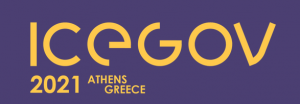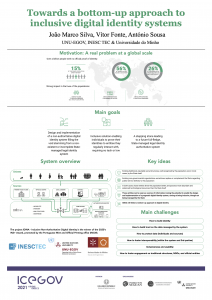
“Towards a bottom-up approach to inclusive digital identity systems” is the title of the paper presented at the 14th edition of the International Conference on Theory and Practice of Electronic Governance (ICEGOV).
The new paper is focused on how a non-authoritative system, such as IDINA, enables the capitalization of the social relations of trust towards an inclusive solution for personal identification.
According to the authors, “unconnected raw data will be consolidated into identity documents following a reinforcement model responsible for: data disambiguation; combining fragmented information from different sources; assessing data quality; and attributing weight to information according to its source trustworthiness. From this point, citizens will be able to use the resulting set of attributes as proof of identity in their daily interactions”.

The paper was presented at the ICEGOV 2021, that took place on October 6th, 7th and 8th. This year’s edition was focused on “Smart Digital Governance for Global Sustainability”. The Conference was organized by the University of the Aegean, the Harokopio University of Athens, and the United Nations University (UNU-EGOV).
This paper was written by João Marco Silva, from UNU-EGOV, INESC TEC and University of Minho, Vítor Fonte, fromm UNU-EGOV, INESC TEC and University of Minho, and António Sousa, from INESC TEC and University of Minho.